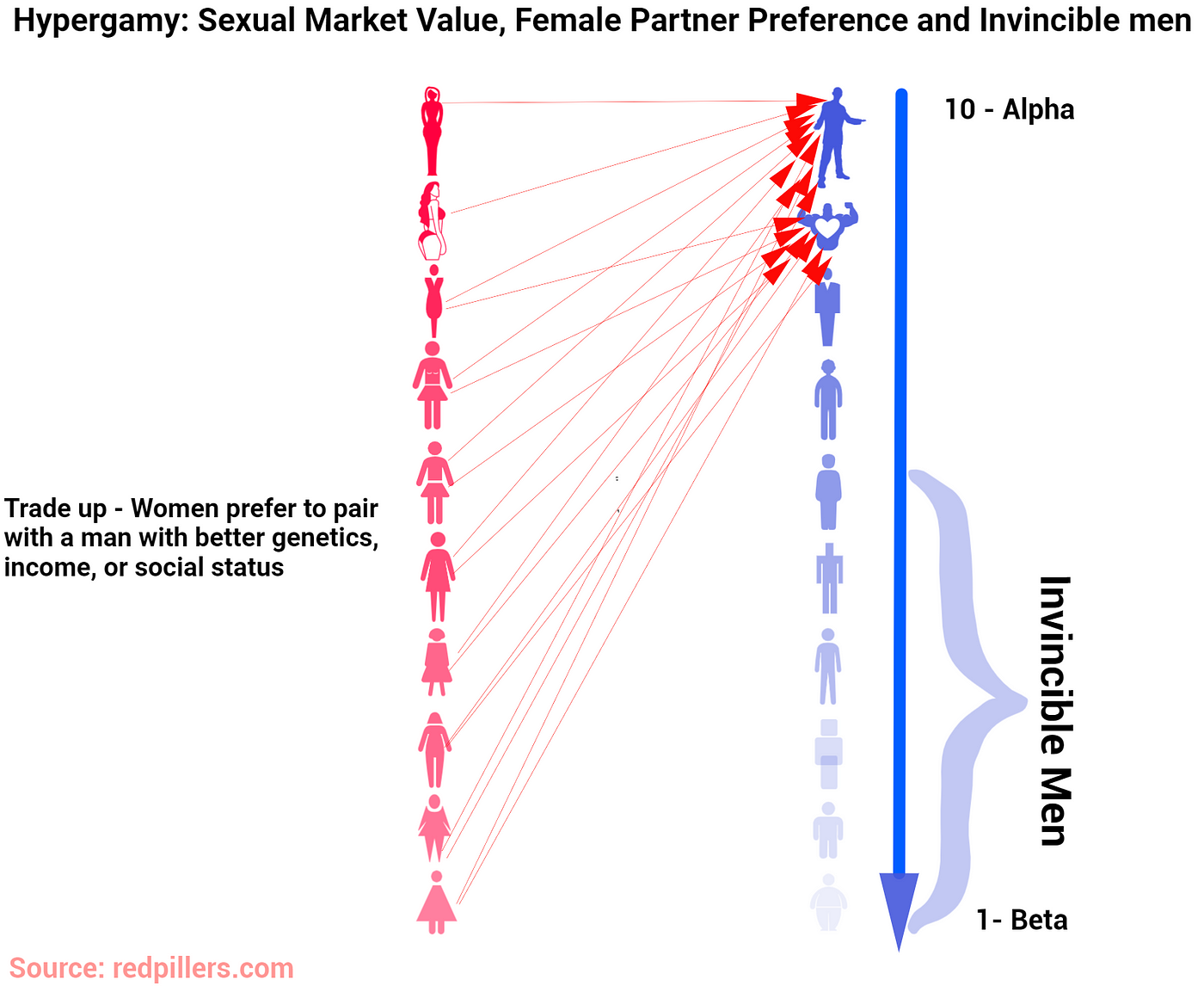Throughout most of human history, the dating / reproduction market has worked like this.

As a result, it’s worth a guy spending considerable energy to be successful, on going all in on his career to being the best in their field in a specific domain.
It’s also interesting that there seems to be a wider range of genetic difference between men and women.
This applies to genetics, height, and many other things. There is some debate about it.
According to “Weak Times Strong Men” book. Looking at two different types of monkeys and how they operate

The chimpanzees have to hunt and seek food and sometimes have a scarcity of resources. The bonobos have more stable and plentiful resources. Their social structures are quite different. Chimpanzees are more of a patriarchy, with one dominant male chimpanzee having access to more females. The Bonobos is more of a matriarchy. They mate more equally each other and there is less competition between males.
The book draws an interesting analogy with human societies. When we are living in times of conflict or scarce resources, as a society we value masculinity more. When we are living in times of abundance, that masculinity is not needed as much, and we value organisation, order and the feminine more. This could be reflected in areas of conflict around the world compared to societies that are more peaceful and tranquil.
This does have important implications for our modern society. What is the role of men and women? This is important in the dating, it’s important to consider when our societies birth rates are falling, and it’s important when we discuss equality.
I do think that we have moved further towards a feminisation of society in some ways. This can be seen in the way that many men idolise women. Instagram and only fans where men are paying for images women is an example of this.
I believe it doesn’t matter what society we are living, as a male, and female, it is important to focus on being the best that you can be.
As a male, it can be important to understand that we have these biological drivers, and to seek to think in the way of chimpanzees. To seek to become strong, to work out and push yourself, and focus on become the best version of yourself.
Here are some points to consider
- The Role of Gender in Modern Society:
- The question of gender roles in contemporary society remains pertinent, especially in the context of evolving societal norms.
- Quote: “In every society, the definition of masculinity and femininity shifts like a pendulum, constantly redefining what it means to be a man or a woman.”
- Consider how changing gender roles impact various aspects of life, including career choices, family dynamics, and personal identity.
- Impact of Social Media and Digital Platforms:
- The rise of platforms like Instagram and OnlyFans highlights a shift in how men and women interact and perceive each other.
- Quote: “Social media has created a new dimension of gender interaction that is profoundly shaping our perceptions of each other and ourselves.”
- Examine how these platforms may reinforce certain stereotypes or create new dynamics in gender relationships.
- Falling Birth Rates and Societal Implications:
- The decline in birth rates has significant implications for societal structures, including the workforce, healthcare, and social security systems.
- Quote: “A society’s birth rate is a window into its future, shaping everything from the size of the next generation’s workforce to the stability of its social safety net.”
- Explore the factors contributing to declining birth rates and how they relate to changing gender roles and societal expectations.
- Feminization of Society:
- The concept of a ‘feminization’ of society can be contentious, implying a shift in societal values towards traits traditionally associated with femininity.
- Quote: “The feminization of society isn’t about the diminishment of masculinity, but about the integration of traditionally feminine qualities into the broader societal fabric.”
- Investigate how this perceived shift affects both men and women in their personal development, career opportunities, and social interactions.
- Biological Drivers and Personal Development:
- Understanding and acknowledging biological drivers, akin to the chimpanzee analogy, can be pivotal in personal growth and societal contributions.
- Quote: “Our biological heritage, while influential, is but one piece of the complex puzzle of human identity and behavior.”
- Discuss the balance between embracing these biological drivers and the societal responsibility to foster an inclusive, equitable environment for all genders.
Here are some more points to consider
- Historical Evolution of Gender Roles: How have gender roles and the perception of masculinity and femininity evolved through different historical periods? For instance, during wartime or economic depressions, were there shifts in societal values towards masculinity or femininity?
- Cross-Cultural Comparisons: Examining different cultures to understand how resource abundance or scarcity shapes societal norms and gender roles. For instance, comparing matrilineal societies like the Mosuo in China to more traditionally patriarchal societies.
- Psychological Impacts: Investigating the psychological effects of societal expectations on individuals, particularly in terms of masculinity and femininity. How do these expectations influence individual self-esteem, mental health, and interpersonal relationships?
- Future Trends in Gender Dynamics: With the rapid changes in technology and global interconnectedness, how might gender roles and societal expectations evolve? Consider the impacts of automation, artificial intelligence, and global climate change.
- Impact of Education and Empowerment: Exploring the role of education and empowerment in shaping gender dynamics. How does access to education influence gender roles and expectations in different societies?
- Genetic Diversity and Human Evolution: Delving deeper into the genetic differences between males and females and how these differences have evolved. What implications does this have for our understanding of human evolution and societal development?
- Economic Factors: How do economic factors like wealth distribution, employment types, and economic policies influence gender roles and societal structures?
- Impact of Media and Pop Culture: Analyzing the role of media and popular culture in shaping and reflecting societal attitudes towards gender roles. How do movies, TV shows, books, and social media contribute to or challenge traditional gender norms?
- Environmental Influences: Investigating how environmental factors, such as urban vs. rural living, access to natural resources, and climate change, impact societal structures and gender dynamics.
- Philosophical and Ethical Considerations: Engaging with philosophical and ethical questions about gender roles and societal expectations. For example, exploring the balance between respecting cultural traditions and promoting gender equality.
